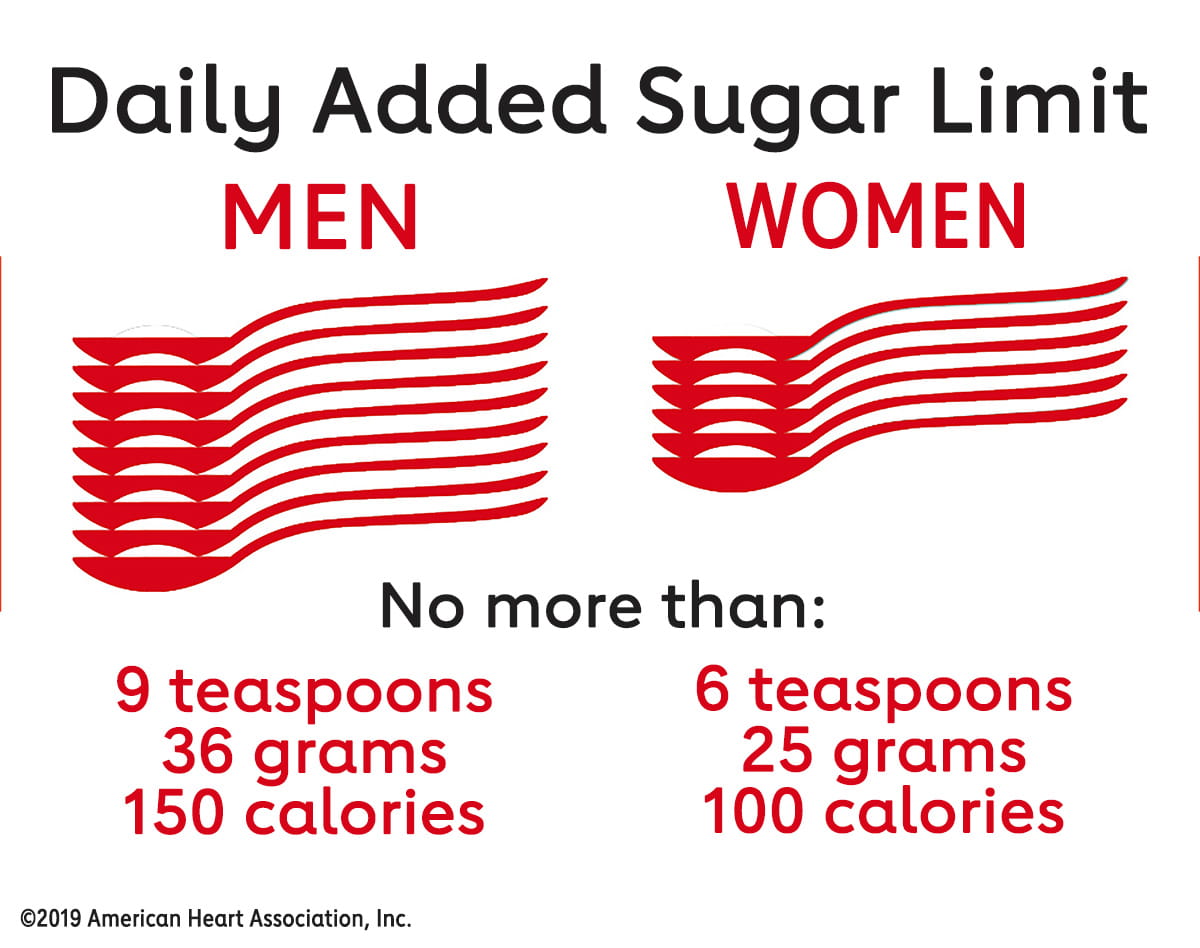In the modern world, sugar surrounds us. It’s in the foods we eat, the beverages we drink, and the snacks we crave. But amidst this abundance, there lies a critical question: how much sugar should we consume each day to maintain optimal health? This question has become increasingly relevant as rates of obesity, diabetes, and other sugar-related health conditions continue to rise.
Sugar: The Basics
Before delving into the recommended daily intake of sugar, it’s essential to understand what sugar is and how it affects our bodies.
Types of Sugar
Sugar comes in various forms, each with its own metabolic implications:
- Glucose: Often referred to as blood sugar, glucose is the primary source of energy for our cells.
- Fructose: Found naturally in fruits and honey, fructose is metabolized differently from glucose and has been linked to metabolic issues when consumed in excess.
- Sucrose: Commonly known as table sugar, sucrose is a combination of glucose and fructose and is frequently added to processed foods.
- Lactose: Present in dairy products, lactose is a disaccharide comprising glucose and galactose.
Natural vs. Added Sugar
Not all sugar is created equal. While natural sugars occur naturally in foods like fruits, vegetables, and dairy, added sugars are incorporated into processed foods and beverages during manufacturing.
Recommended Daily Intake of Sugar

Understanding the optimal amount of sugar to consume daily is crucial for maintaining overall health and well-being. Here, we delve deeper into the recommended guidelines and considerations surrounding sugar intake.
Dietary Guidelines and Recommendations
- Limiting Added Sugars: According to the 2020-2025 Dietary Guidelines for Americans, individuals should aim to limit their intake of added sugars to less than 10% of their total daily calories. This recommendation aligns with the goal of promoting a balanced diet that supports optimal health and reduces the risk of chronic diseases.
- Caloric Limits: For a standard 2,000-calorie diet, this translates to no more than 200 calories or 50 grams of added sugar per day. By adhering to these guidelines, individuals can maintain a healthy balance between energy needs and nutritional requirements.
- Stricter Recommendations: Health organizations like the American Heart Association (AHA) advocate for even stricter limits on added sugar intake. The AHA recommends limiting added sugars to no more than 25 grams (6 teaspoons) per day for women and 36 grams (9 teaspoons) per day for men. These recommendations reflect the growing recognition of the adverse health effects associated with excessive sugar consumption.
Health Implications of Excessive Sugar Consumption
- Obesity and Metabolic Syndrome: Excessive sugar intake contributes to weight gain and obesity, increasing the risk of metabolic syndrome—a cluster of conditions including elevated blood pressure, high blood sugar, abnormal cholesterol levels, and excess abdominal fat. Metabolic syndrome significantly raises the risk of developing cardiovascular disease, type 2 diabetes, and other serious health issues.
- Dental Health: Sugary foods and beverages fuel the growth of harmful bacteria in the mouth, leading to tooth decay, cavities, and gum disease. Prolonged exposure to sugary substances compromises dental health and necessitates diligent oral hygiene practices to prevent oral health problems.
- Mental Health: While the relationship between sugar consumption and mental health is complex, some studies suggest a correlation between high sugar diets and adverse mood outcomes, including depression and anxiety. Excessive sugar intake may disrupt neurotransmitter function and exacerbate mood disorders in susceptible individuals.
Strategies for Reducing Sugar Intake
- Reading Nutrition Labels: Familiarizing oneself with nutrition labels and ingredient lists helps identify hidden sources of added sugars in packaged foods and beverages. Choosing products with minimal added sugars and opting for whole, unprocessed foods reduces overall sugar intake and promotes healthier eating habits.
- Choosing Whole Foods: Prioritizing whole, nutrient-dense foods like fruits, vegetables, lean proteins, and whole grains minimizes exposure to added sugars and provides essential nutrients, fiber, and antioxidants. Cooking meals at home allows for greater control over ingredients and promotes a balanced diet.
- Mindful Snacking: Incorporating whole fruits, nuts, yogurt, or vegetables into snacks and meals satisfies cravings, stabilizes blood sugar levels, and reduces the consumption of sugary snacks and desserts. Planning snacks ahead of time and practicing portion control fosters mindful eating habits and supports overall health.
Identifying and Reducing Sugar Consumption

Understanding how to identify sources of sugar in our diets and implementing strategies to reduce consumption are essential steps towards promoting overall health and well-being. Let’s delve deeper into the process of identifying and reducing sugar consumption.
Reading Nutrition Labels
- Understanding Added Sugars: Nutrition labels provide valuable information about the amount of added sugars in packaged foods and beverages. By scrutinizing these labels, individuals can identify products with high levels of added sugars and make informed choices about their consumption.
- Spotting Hidden Sugars: Many processed foods contain hidden sources of sugar under various names, such as sucrose, high-fructose corn syrup, or dextrose. Learning to recognize these alternative names for sugar enables individuals to identify hidden sources of added sugars in their diets.
Choosing Whole, Unprocessed Foods
- Prioritizing Natural Sources: Whole, unprocessed foods like fruits, vegetables, lean proteins, and whole grains contain naturally occurring sugars along with essential nutrients, fiber, and antioxidants. By prioritizing these nutrient-dense options, individuals can reduce their reliance on processed foods and minimize their intake of added sugars.
- Cooking at Home: Cooking meals at home allows for greater control over ingredients and portion sizes. By preparing homemade meals using whole ingredients, individuals can minimize their exposure to added sugars and create balanced, flavorful dishes that support their health goals.
Practicing Mindful Eating Habits
- Being Mindful of Portion Sizes: Practicing portion control helps individuals manage their sugar intake and prevent overconsumption of sugary snacks and desserts. By paying attention to portion sizes and eating mindfully, individuals can enjoy their favorite treats in moderation while maintaining a balanced diet.
- Choosing Nutrient-Dense Snacks: Incorporating nutrient-dense snacks like whole fruits, nuts, yogurt, or vegetables into daily eating habits satisfies cravings, stabilizes blood sugar levels, and reduces the temptation to indulge in sugary snacks. Planning snacks ahead of time and keeping healthy options readily available supports mindful eating habits and promotes overall health.
Seeking Support and Accountability
- Connecting with Others: Finding support from friends, family members, or online communities who share similar health and wellness goals can provide encouragement, motivation, and accountability in reducing sugar consumption. Sharing experiences, recipes, and tips for healthier eating fosters a sense of community and reinforces positive lifestyle changes.
- Consulting with a Nutrition Professional: Seeking guidance from a registered dietitian or nutrition professional offers personalized recommendations and strategies for reducing sugar intake. A qualified expert can provide tailored advice, address individual concerns, and support individuals in making sustainable dietary changes that promote long-term health and well-being.
The Impact of Sugar on Health

Understanding the ramifications of sugar consumption on health extends beyond its role in providing energy. Delving deeper into the effects of sugar on various aspects of health sheds light on the importance of moderation and informed dietary choices.
Obesity and Metabolic Syndrome
- Weight Gain: High sugar diets contribute significantly to weight gain and obesity. Excessive sugar intake overwhelms the body’s ability to metabolize it, leading to the storage of unused energy as fat.
- Metabolic Syndrome: Chronic consumption of sugary foods and beverages is closely linked to metabolic syndrome—a cluster of conditions including elevated blood pressure, high blood sugar, abnormal cholesterol levels, and excess abdominal fat. Metabolic syndrome significantly raises the risk of developing cardiovascular disease, type 2 diabetes, and other serious health issues.
Dental Health
- Tooth Decay: Sugar fuels the growth of harmful bacteria in the mouth, leading to tooth decay and cavities. Frequent consumption of sugary snacks and beverages, especially those high in sucrose and fructose, accelerates tooth decay and compromises dental health.
- Gum Disease: Prolonged exposure to sugary substances increases the risk of gum disease, inflammation of the gums, and periodontal infections. Maintaining a low-sugar diet and practicing proper oral hygiene are essential for preserving dental health.
Mental Health
- Impact on Mood: While the relationship between sugar consumption and mental health is complex, some studies suggest a correlation between high sugar diets and adverse mood outcomes, including depression and anxiety. Excessive sugar intake may disrupt neurotransmitter function and exacerbate mood disorders in susceptible individuals.
- Cognitive Function: Chronic consumption of sugary foods and beverages has been associated with impaired cognitive function and reduced cognitive performance. Fluctuations in blood sugar levels can affect concentration, memory, and overall cognitive health, highlighting the importance of balanced nutrition for optimal brain function.
Inflammatory Response
- Chronic Inflammation: High sugar diets are implicated in promoting chronic inflammation—a key driver of many chronic diseases, including heart disease, diabetes, and cancer. Excessive sugar consumption triggers an inflammatory response in the body, leading to oxidative stress, tissue damage, and systemic inflammation.
- Immune Function: Prolonged exposure to high levels of sugar compromises immune function and increases susceptibility to infections and illnesses. Chronic inflammation suppresses the immune system’s ability to mount an effective response against pathogens, leaving the body vulnerable to infections and compromising overall health.
Long-Term Health Implications
- Cardiovascular Disease: Epidemiological studies consistently link high sugar intake to an increased risk of cardiovascular disease, including coronary artery disease, stroke, and heart attack. Excessive sugar consumption contributes to elevated blood pressure, dyslipidemia, and insulin resistance—all of which are major risk factors for cardiovascular disease.
- Type 2 Diabetes: Chronic consumption of sugary foods and beverages is a significant risk factor for developing type 2 diabetes. Excessive sugar intake overwhelms the body’s insulin response, leading to insulin resistance and impaired glucose metabolism. Over time, this can progress to type 2 diabetes and other metabolic disorders.
Cancer Risk
- Tumor Growth: Emerging evidence suggests a potential link between high sugar diets and an increased risk of certain types of cancer. Excessive sugar consumption promotes insulin resistance, chronic inflammation, and oxidative stress—all of which create an environment conducive to tumor growth and proliferation.
- Breast and Colon Cancer: Studies have shown that diets high in sugar and refined carbohydrates may increase the risk of breast and colon cancer. Sugar consumption influences hormone levels, cellular signaling pathways, and metabolic processes implicated in cancer development and progression.
Practical Tips for Reducing Sugar Intake

While understanding the adverse effects of excessive sugar consumption on health is crucial, implementing practical strategies to reduce sugar intake is equally essential. Here, we explore actionable tips to help individuals make healthier dietary choices and minimize their sugar consumption effectively.
Embrace Hydration with Water and Unsweetened Beverages
- Swap Sugary Drinks: Replace sugary sodas, fruit juices, and sweetened beverages with water, herbal tea, or flavored sparkling water. Opting for hydrating alternatives reduces liquid calories and diminishes sugar intake without sacrificing taste or refreshment.
- Infuse Flavor Naturally: Enhance the flavor of water by infusing it with fresh fruits, herbs, or citrus slices. Experiment with combinations like cucumber and mint, lemon and ginger, or berries and basil to create delicious, sugar-free beverages.
Prioritize Whole Fruits Over Processed Snacks
- Choose Nutrient-Dense Options: Instead of reaching for processed snacks and desserts laden with added sugars, opt for whole fruits like apples, bananas, or berries. Whole fruits provide natural sweetness, fiber, and essential nutrients, satisfying cravings and promoting satiety without excess sugar.
- Snack Mindfully: Incorporate fruits into snacks and meals throughout the day to curb hunger and prevent overindulgence in sugary treats. Pair fruits with protein-rich foods like nuts, yogurt, or cheese for a balanced and satisfying snack that stabilizes blood sugar levels.
Read Labels and Avoid Hidden Sugars
- Understand Ingredient Lists: Thoroughly read nutrition labels and ingredient lists to identify hidden sources of sugar in packaged foods and beverages. Look for alternative names for sugar, such as sucrose, high-fructose corn syrup, or dextrose, and choose products with minimal added sugars.
- Choose Whole, Unprocessed Foods: Prioritize whole, unprocessed foods like fresh fruits, vegetables, lean proteins, and whole grains, which contain minimal added sugars and provide essential nutrients. Cooking meals at home allows for greater control over ingredients and reduces reliance on processed foods.
Limit Sugar in Cooking and Baking
- Use Natural Sweeteners: Experiment with natural sweeteners like honey, maple syrup, or fruit purees as alternatives to refined sugars in cooking and baking. These options add sweetness and flavor without excessive sugar and offer additional nutrients and antioxidants.
- Reduce Sugar Content: Gradually reduce the amount of sugar called for in recipes when cooking or baking at home. Adjusting sugar levels to taste preferences over time helps recalibrate taste buds and reduces reliance on excessive sweetness.
Be Mindful of Portion Sizes and Frequency of Indulgence
- Practice Portion Control: Enjoy sugary treats and desserts in moderation, focusing on portion sizes and frequency of indulgence. Savor small servings of favorite sweets occasionally, rather than consuming large quantities in one sitting.
- Plan Occasional Treats: Incorporate occasional treats into a balanced and varied diet, allowing for enjoyment without guilt or restriction. Plan ahead for special occasions or celebrations, and savor each indulgence mindfully.
Seek Support and Accountability
- Find Like-Minded Individuals: Connect with friends, family members, or online communities who share similar health and wellness goals. Surrounding oneself with supportive individuals fosters accountability, motivation, and encouragement in making healthier choices.
- Consult with a Registered Dietitian: Seek guidance from a registered dietitian or nutrition professional for personalized recommendations and strategies to reduce sugar intake. A qualified expert can provide tailored advice, address individual concerns, and support long-term dietary changes.
Conclusion
In conclusion, the recommended daily intake of sugar varies depending on individual factors such as age, sex, activity level, and health status. However, striving to limit added sugar intake to less than 10% of total daily calories is a prudent goal supported by dietary guidelines and health organizations. By making mindful food choices, reading nutrition labels, and prioritizing whole, nutrient-dense foods, individuals can reduce their sugar consumption and support long-term health and well-being. Remember, moderation is key, and small changes can lead to significant improvements in overall health.





